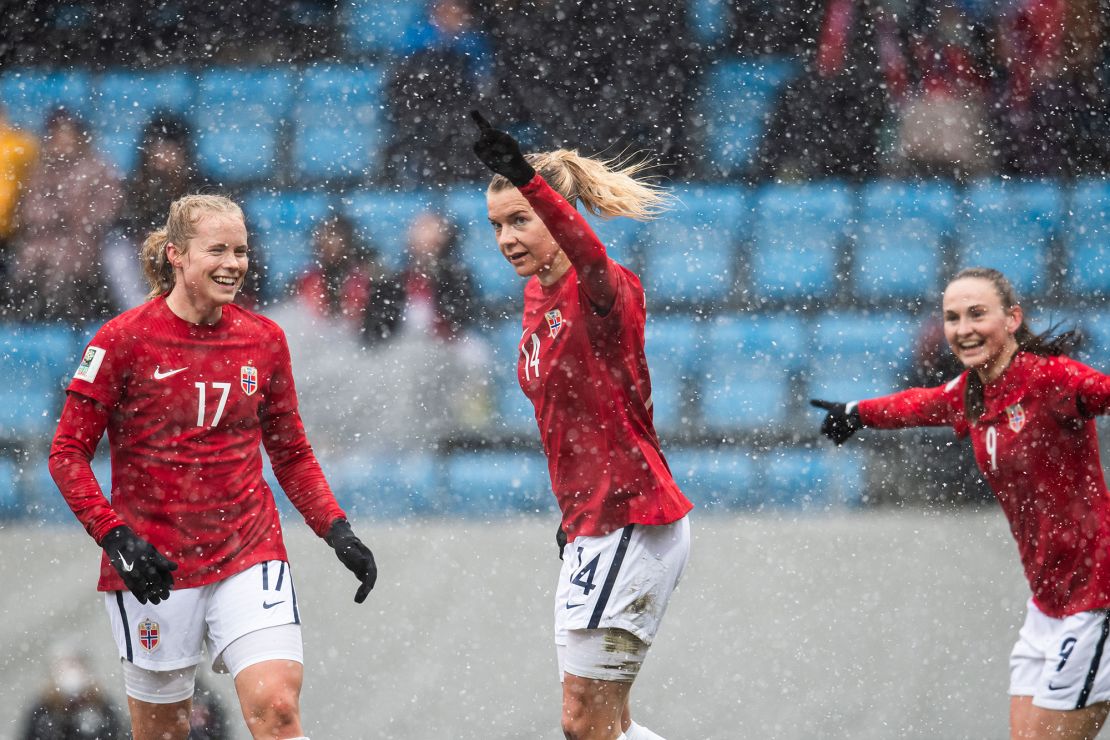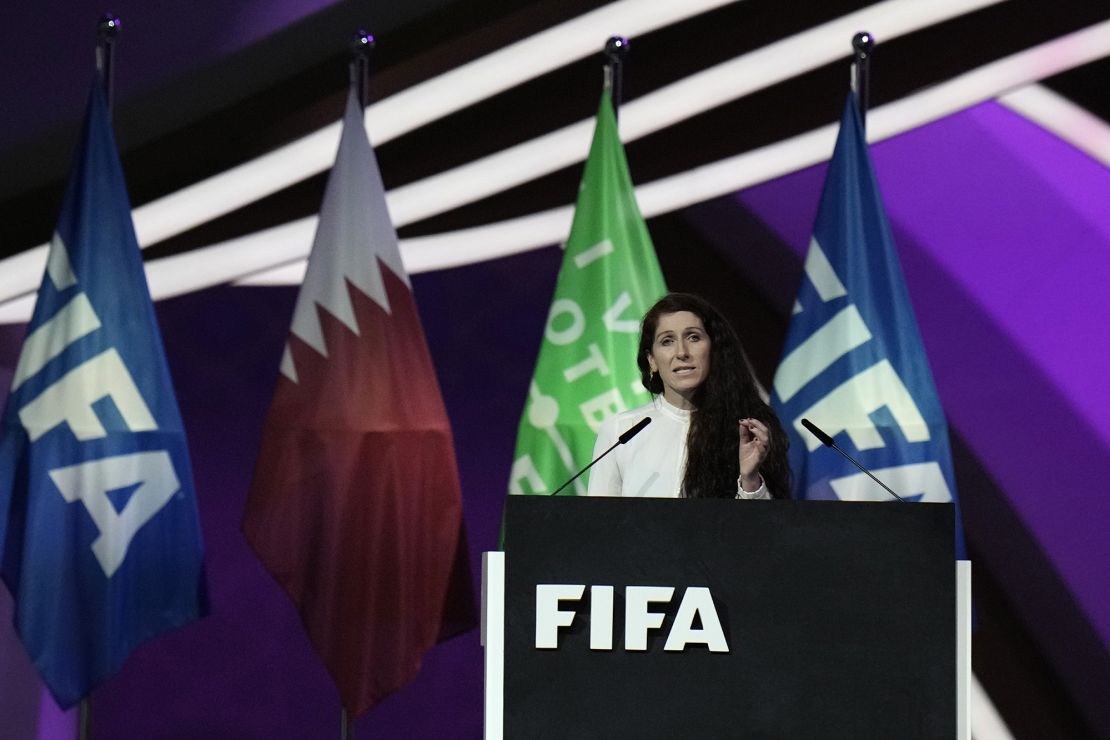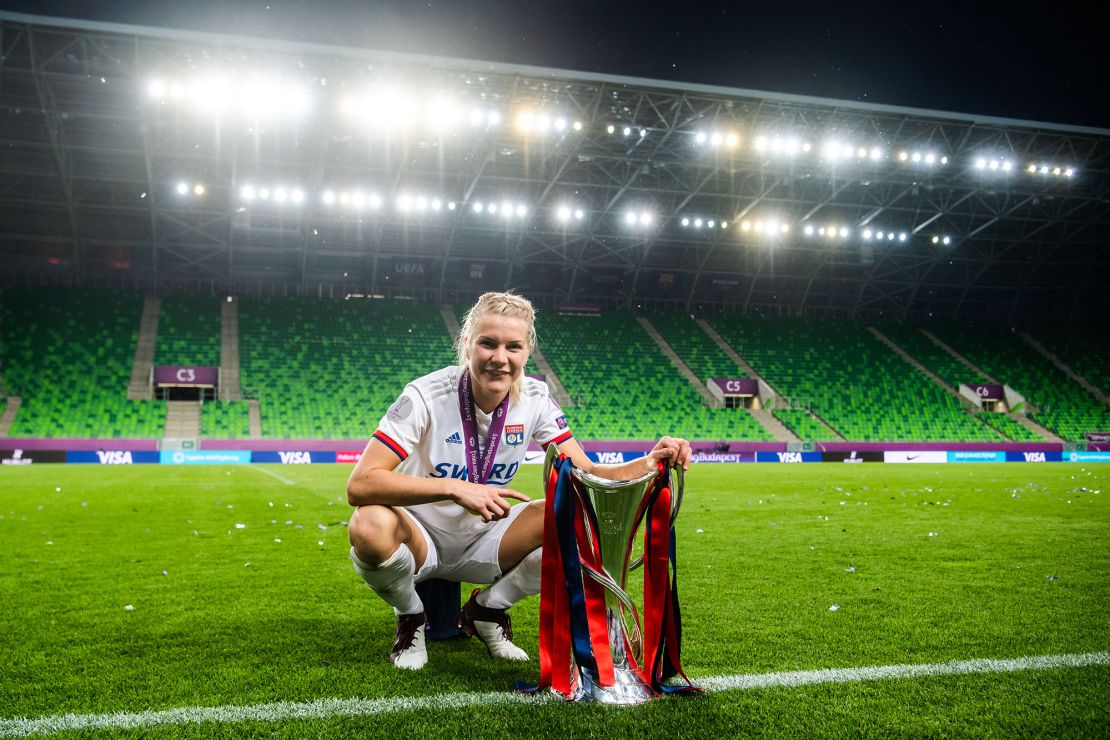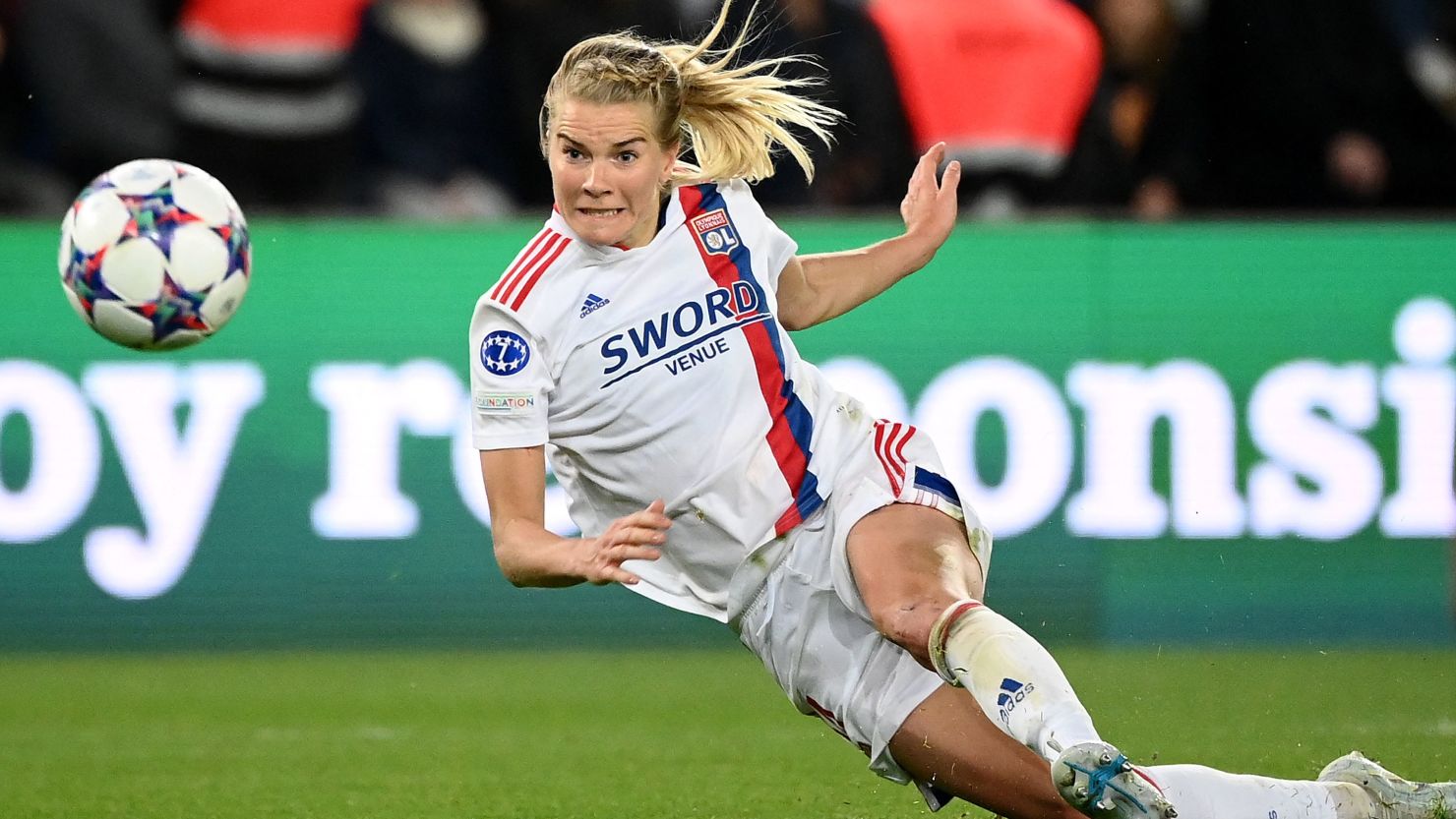It was windy and it was snowing. “A very classical Norwegian evening,” as Ada Hegerberg puts it.
Despite the inclement weather conditions at the Release Arena in Sandefjord, the Norwegian’s overriding emotion was one of joy.
She was playing her first match for Norway in five years, celebrating the occasion with a hat-trick as her team hammered Kosovo 5-1 in the Women’s World Cup qualifying last month.
“The crowd came, they came to support it, which I find amazing, Hegeberg tells CNN’s Christina MacFarlane.
“Obviously I’m very focused before games and everything, but seeing the national team again and seeing all these young girls, young boys showing up to watch us play was something that hit me deep in. And it was just a joyful feeling. I’m going to cherish that for a very long time.”
Five years ago, Hegerberg – then aged 21 – stepped away from the national team after her experiences with the side left her “mentally broken” and frustrated with the way women’s football was regarded in Norway.
“I can clearly say that I never hope it happens to another player again, that you should be put in a position where you need to make a choice like that,” she says following her return to the side.
“But at the moment, I would never forget it. I think we should embrace the whole history. But at the same time, I’ve kind of moved on as well.”

During her absence from the national team, Hegerberg established herself as one of the best players in the world. She holds the record for the most goals scored in the Champions League with 56 and was awarded the first-ever Ballon d’Or Feminin in 2018.
As well as these individual accolades, Hegerberg achieved great success with Lyon, guiding the club to five consecutive Champions League titles – a record for a team of any gender. On Saturday in Turin, Lyon face Barcelona in this season’s Champions League final.
‘A new chapter’
Despite these accomplishments, Hegerberg remained outside the international arena, steadfastly maintaining her stance against the Norwegian Football Federation (NFF).
The 2019 Women’s World Cup did not tempt her back into the national setup, and Hegerberg says it was only the recent election of Lise Klaveness as president of the NFF – the first woman to hold that position – that convinced her to return.
The pair played together when Hegerberg was at the start of her career, and she says discussions with Klaveness were central to her return to the national team. They connected over their shared difficulties with the federation, and the challenges facing women’s football.
“I felt like I was growing a lot during those talks, but I felt that it was the right time to go back and play for my country again,” Hegerberg says.
“I really believe that Lise can be a very important figure and position to kind of shake up things still so that young girls can be taken better care of for the future. I would absolutely back her all the way in order to drive women’s football into the right direction. So it feels very good.”

Since Hegerberg stepped away from the national team, the NFF has changed its approach towards the women’s team.
Men and women now receive the same financial compensation for representing Norway following an agreement that doubled the remuneration pot for women from 3.1 million Norwegian kroner ($330,739) to six million kroner ($640,150).
“Obviously, you shouldn’t forget in order not to repeat the same history, but I feel like it’s a new chapter, that it’s ongoing and it’s very refreshing as well,” says Hegerberg.
“And obviously it’s being back trying to build on something because you have very good players out in Europe now, Norwegian girls.
“So I think now is the moment just to build stone by stone. And I am very much motivated as well to take a part of the responsibility to keep on pushing the football into the right direction in Norway.”
‘Give the conditions that women players deserve’
It is not just in Norway where the conversations surrounding women’s football have changed in the intervening years between Hegerberg’s last two international appearances.
Last month, the Italian Football Federation (FIGC) announced that footballers playing in Italy’s top women’s league – Serie A – would be classed as professional athletes, ending years of capped salaries due to their amateur status.
“I feel like we’re slowly starting to gain momentum again to get back in that good rhythm that we had before Covid struck us and are building more professionally,” Hegerberg says.
“Give the conditions that the women players deserve and broadly get a more professional daily life so that we can become even better and show even better football long term. It’s all about pushing us players – we’ve just got to perform really.”
Female players are increasingly performing on the biggest of stages. Camp Nou – Barcelona’s stadium – sold out twice in recent months, setting consecutive records for the highest attendance at a women’s football match.
In March, 91,553 fans watched Bar?a defeat Real Madrid in a UEFA Champions League quarterfinal and, less than a month later, 91,648 cheered their home team to a 5-1 victory over Wolfsburg in the semifinal.
“It’s brilliant,” Hegerberg says. “It’s what you want to achieve in the game and seeing those sellouts, full-packed Camp Nou – it’s amazing, really.
“That’s what we try to achieve, every women’s club. We’ve seen some good trends. And now the big challenge is to get those people back to the stadiums week in and week out and get that stability that we need.”

‘The best part of the season’
Last season, without an injured Hegerberg, Lyon failed to reach the Champions League final for just the third time in 10 years, ending the club’s five-year reign as European champion. Barcelona took advantage of Lyon’s absence and is now seeking a first back-to-back title.
“Obviously Barcelona is a very strong team,” Hegerberg said. “You can see that they have gotten time to develop their style of game together. They play a very strong possession orientated football as well.”
Hegerberg is playing knockout football for the first time in three years after she was sidelined for nearly two seasons with a ruptured anterior cruciate ligament in January 2020 and then a stress fracture to her left tibia.
“I’m just trying to enjoy every day, every second with the ball and spring is here and the big games are coming up,” she says. “So it’s probably the best part of the season as well.”
After the Champions League final, Hegerberg is looking forward to the 2022 UEFA European Women’s Championship – her first major tournament following her return to the Norwegian side.
“It’s a tough tournament,” Hegerberg says. “It can go both ways. It’s all about preparing in a very calm but focused manner. And yeah, we’ll be ready for it all. But we know from the past that we’ve experienced a final back in 2013 and then we experienced the very tough Euros in 2017.”
Norway lost all three of its group matches in 2017, a disappointing series of results for a team ranked fourth at the start of the tournament.
This time around, Norway’s campaign kicks off with a match against Northern Ireland on the July 7 as it seeks to advance to the knockout stages from a group that also contains Austria and England.
“It’s all about learning from those experiences and being as prepared as possible,” Hegerberg says, “but also enjoying because those tournaments are a highlight of your career.”
DAZN is showing the UEFA Women’s Champions League final on its YouTube channel for free.
